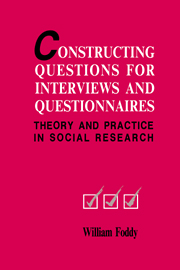Book contents
- Frontmatter
- Contents
- Tables
- Figures
- Preface
- Chapter 1 An initial statement of the problem
- Chapter 2 A theoretical framework
- Chapter 3 Defining topics properly
- Chapter 4 Formulating intelligible requests for information
- Chapter 5 Contextual influences on respondents' interpretations of questions
- Chapter 6 The need to provide response frameworks
- Chapter 7 The limitations of human memory
- Chapter 8 Filters: establishing the relevance of questions to respondents
- Chapter 9 Reducing question threat
- Chapter 10 The open vs. closed questions debate
- Chapter 11 Measuring attitudes
- Chapter 12 Checks to ensure that questions work as intended
- Chapter 13 Concluding comments
- The tap paradigm
- References
- Index
- Acknowledgements
Chapter 13 - Concluding comments
Published online by Cambridge University Press: 04 September 2009
- Frontmatter
- Contents
- Tables
- Figures
- Preface
- Chapter 1 An initial statement of the problem
- Chapter 2 A theoretical framework
- Chapter 3 Defining topics properly
- Chapter 4 Formulating intelligible requests for information
- Chapter 5 Contextual influences on respondents' interpretations of questions
- Chapter 6 The need to provide response frameworks
- Chapter 7 The limitations of human memory
- Chapter 8 Filters: establishing the relevance of questions to respondents
- Chapter 9 Reducing question threat
- Chapter 10 The open vs. closed questions debate
- Chapter 11 Measuring attitudes
- Chapter 12 Checks to ensure that questions work as intended
- Chapter 13 Concluding comments
- The tap paradigm
- References
- Index
- Acknowledgements
Summary
Over the years, social researchers have become more and more reliant upon verbal data and this trend does not seem to be in any danger of reversing. Although the procedures that have been used to collect verbal data are probably no worse than the procedures that have been used to collect other kinds of data (e.g. observational procedures, unobtrusive measures of physical phenomena) it is still worth our while to make every effort to improve both their validity and their reliability. The position that has been taken, in this text, is that the best way to improve the quality of the verbal data we collect is through a better understanding of the nature of question-answer behaviour.
It has been a basic contention that factors which affect the way questions work cannot be understood in isolation from the context in which they are employed. This position has been adopted because human communication is seen to be reflexive in character. Human beings take one another's viewpoint into account when interpreting each other's verbal behaviour. Respondents' answers reflect what they assume the researcher wants to know as well as what they assume the researcher will do with the information they give. Among other things, these principles imply that respondents should be seen as constantly formulating interpretations of the researcher's behaviour which, in turn, constantly influence their own behaviour toward the researcher. They also imply that it is wrong to treat respondents as if they are passive players reacting only to the researcher's demands.
- Type
- Chapter
- Information
- Constructing Questions for Interviews and QuestionnairesTheory and Practice in Social Research, pp. 189 - 192Publisher: Cambridge University PressPrint publication year: 1993



